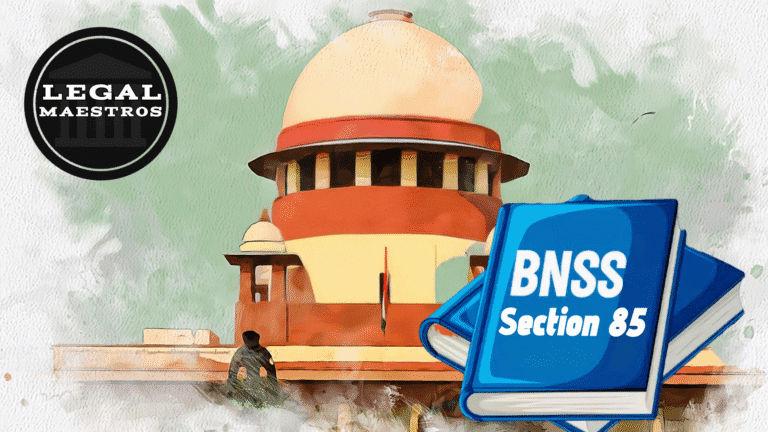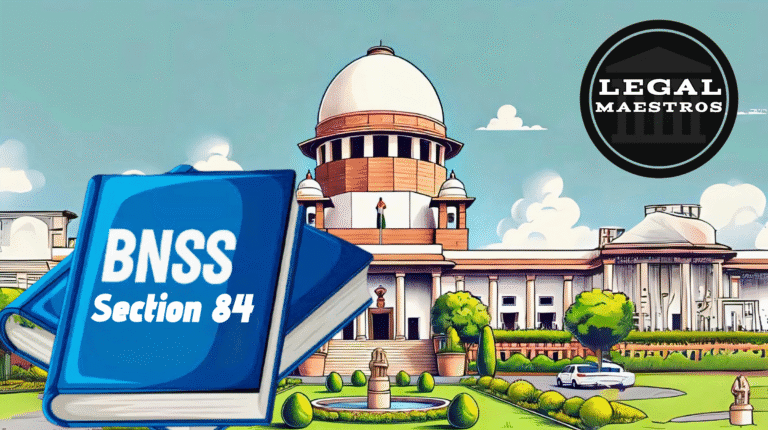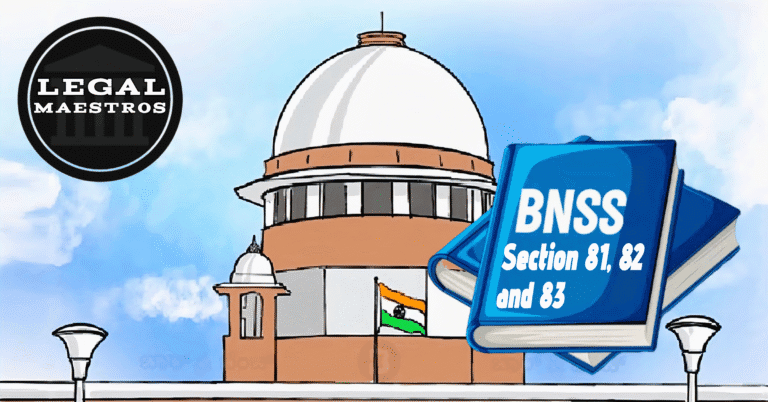
Section 78: Person Arrested to be Brought Before Court Without Delay
According to Section 78 of the Bharatiya Nagarik Suraksha Sanhita, 2023, it is of utmost importance to bring an individual who has been apprehended before a magistrate without any undue delay. In addition to serving as a safeguard against arbitrary detention, it serves as a reaffirmation of the fundamental rights of citizens.
When a person is arrested on the basis of a warrant, the primary need is that the police officer or the person who is executing the warrant must take the individual who was arrested to the court as quickly as feasible. The individual ought to be taken before the particular court that is legally authorized to try or investigate the case, or that is the court that issued the warrant.
The clause makes it abundantly apparent that this wait should not be longer than twenty-four hours, with the exception of the time that is required for the transit from the location where the arrest was made to the magistrate’s court. By ensuring that the person who has been arrested is not held in custody for a longer period of time than is required without being brought before a judicial authority, this section serves as an essential check on the authorities that are responsible for law enforcement.
For any queries or to publish an article or post or advertisement on our platform, do call at +91 6377460764 or email us at contact@legalmaestros.com.
It is illustrated
Let’s say that a Magistrate in Kanpur issues a warrant for the arrest of a person named Ravi, and that individual is taken into custody in Lucknow. By car, it takes around five hours to travel the distance between the two cities. In the event that Ravi is taken into custody, the authorities are obligated to transfer him to Kanpur and must present him before the court within twenty-four hours, with the exception of the five hours that are spent traveling. To put it another way, the police have approximately twenty-four hours plus five hours to bring Ravi before the magistrate. Without judicial monitoring, they are unable to retain him for any longer than this period of time.
This clause guarantees that there is transparency of the situation and gives the individual who has been arrested the option to seek legal remedy, including bail, in a timely manner.
Section 79: Where Warrant May Be Executed
Whether or not a warrant of arrest is applicable to a certain territory is the subject of Section 79. In order to carry out the execution of a warrant, it provides law enforcement authorities with a broad authority. at accordance with this rule, a warrant of arrest that has been issued by any court that is competent can be carried out at any location within India.
For any queries or to publish an article or post or advertisement on our platform, do call at +91 6377460764 or email us at contact@legalmaestros.com.
The authority to arrest an accused person is granted to law enforcement officers under this clause, even if the accused person is located in a separate state or union territory. The execution of the warrant is not limited by restrictions imposed by the limits of the state or district.
It is illustrated
Imagine that a magistrate in Mumbai issues a warrant against a person named Suresh who is now staying in Kolkata. The warrant is issued against Suresh. Because of Section 79, the Mumbai police or the designated officer are able to travel to Kolkata and carry out the execution of the warrant without the need for extra clearance from the local authorities. However, it is possible that the participation of the local police will be required depending on the circumstances.
Because of this, the administration of justice across the country is more efficient, and procedural delays that may otherwise occur as a result of stringent jurisdictional constraints are avoided.
For any queries or to publish an article or post or advertisement on our platform, do call at +91 6377460764 or email us at contact@legalmaestros.com.
Section 80: Warrant Forwarded for Execution Outside Jurisdiction
The procedure for carrying out warrants that are issued by a court that is not located within its jurisdiction is described in greater detail in Section 80. When the court does not desire to send a warrant directly through a police officer from its own jurisdiction, it offers an alternative to the standard procedure.
Transmission of the Warrant, as outlined in Section 1
If a warrant is to be executed outside of the court’s local jurisdiction, the court has the option of sending the warrant to an Executive Magistrate, District Superintendent of Police, or Commissioner of Police in the jurisdiction in which the order is to be executed. This can be done over the mail or through other means.
After the warrant has been sent to the authority that is receiving it, the receiving authority is obligated to sign their name on the warrant. The purpose of this endorsement is to act as a formal acknowledgment that the warrant has been received and that it is now legally valid for execution in that particular jurisdiction. Following the endorsement, the official is responsible for expediting the execution of the warrant in accordance with the authorized procedure, which was previously outlined in the legal rules for arrest.
For any queries or to publish an article or post or advertisement on our platform, do call at +91 6377460764 or email us at contact@legalmaestros.com.
It is illustrated
Imagine that a court in Bhopal issues a warrant for Priya, who is thought to be in Chennai at the time of the warrant’s dispatch. It is possible for the court to send the warrant straight to the Commissioner of Police in Chennai, rather than sending a Bhopal police officer all the way to Chennai. Following this, the Commissioner will give his approval to the warrant and give his police instructions to carry out the arrest.
In addition to ensuring that resources are utilized effectively, this method improves collaboration between different authorities.
Subsection (2): The Details of the Information That Is Going to Be Delivered
In accordance with the provisions of this sub-section, the court is required to transmit not only the warrant, as outlined in the preceding sub-section (1), but also the information that forms the basis of the warrant. It is also important to send any supporting documents that may be present, if there are any.
For any queries or to publish an article or post or advertisement on our platform, do call at +91 6377460764 or email us at contact@legalmaestros.com.
There is a very significant purpose that this criterion addresses. It gives the Executive Magistrate or the court that is operating under Section 83 (which deals with bail and detention) the ability to determine whether or not the person who has been arrested should be given bail from their custody.
Furthermore, it guarantees that the receiving authority is in possession of sufficient information to make an educated choice on the custody or release of the individual who has been detained.
It is illustrated
When the court in Bhopal sends the warrant to Chennai, it is required to additionally give a summary of the charges or allegations that have been made against Priya. This is consistent with the scenario that was shown earlier. If there are any papers, such as copies of the complaint, comments from witnesses, or extracts from the FIR, that are pertinent to determining whether or not she is eligible for bail, then those documents must be submitted.
For any queries or to publish an article or post or advertisement on our platform, do call at +91 6377460764 or email us at contact@legalmaestros.com.
Even in situations when the arrest takes place outside of the jurisdiction of the court that issued the warrant, this clause ensures that the individual who was detained is afforded the right to a fair hearing and prevents excessive incarceration.




![JOB POST: Junior Associate at ASM Law Chambers, Jaipur [Freshers]](https://legalmaestros.com/wp-content/uploads/2025/11/Gemini_Generated_Image_8wrxer8wrxer8wrx-768x708.png)


